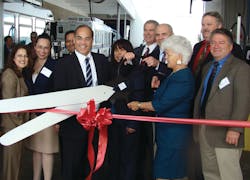Montebello Bus Lines Opens New CNG Fuel Station
Montebello Bus Lines celebrated the completion of a $2.4 million Compressed Natural Gas (CNG) fuel facility. City of Montebello Mayor Frank A. Gomez, Congresswoman Grace Napolitano (38th District) and Federal Transportation Administration Team Leader Ray Tellis were among the guests that helped commemorate the opening of the fuel station at Montebello bus yard. Congresswoman Napolitano, who serves on the Congressional Transportation and Infrastructure Committee, was instrumental in securing $6.1 million for capital projects including the new CNG fuel station and CNG-fueled buses.
“These new, clean-burning natural gas buses will allow people to continue to commute in comfort and at the same time improve our air quality,” said Napolitano. “This fuel station will help support Montebello’s growing fleet of natural gas buses.”
At the ribbon cutting ceremony, FTA Team Leader Ray Tellis commented, “This is an excellent example of how the TIGGER program and other federal programs can work quickly to stimulate the economy. The manufacturing of the CNG buses and the construction of the fuel station created jobs locally. It also demonstrates a commitment at the local, state and federal level to reduce our dependency on foreign fuel and improve the quality of life for everyone.”
Montebello Bus Lines’ fleet reflects the agency’s dedication to reducing greenhouse emissions as well as its carbon footprint. Currently, Montebello has seven CNG-fueled buses, 45 hybrids (electric/gasoline) and 14 diesel buses which are scheduled to be replaced by CNG-fueled buses by 2014.
CNG vehicles emit up to 20 percent less greenhouse gas than regular gasoline or diesel vehicles and CNG is also on average $1.50 less per gallon than diesel fuel. Ninety-eight percent of natural gas is produced in North America and there is a 120-year supply of natural gas according to the North American Natural Gas Supply Assessment.
“There are so many positive aspects to using CNG over diesel,” says Montebello Bus Lines Director of Transportation Aurora Jackson. “We’re saving on operating costs, stabilizing our fuel source, securing permanent jobs and lessening our carbon emissions.”
The fuel station was built by Seal Beach-based Clean Energy, a leading manufacturer of alternative fueling facilities. According to Clean Energy, MBL’s station is unique in that it has two state of the art booster compressors and two primary compressors. The booster compressors maximize the amount of gas that can be compressed and dispersed at the source before going into the primary compressors. They allow MBL to efficiently and cost effectively deliver nearly 500 gallons of natural gas per hour to the bus yard using the same natural gas that is delivered to residential consumers. This capacity not only meets the agency’s current demand, but will also be sufficient as the fleet expands.
MBL’s CNG fuel station was funded by the Transit Investments for Greenhouse Gas and Energy Reduction (TIGGER) federal program. Through the TIGGER program, the federal government appropriated $75 million to transit agencies nationwide for capital investments to help reduce energy consumption and greenhouse gas emissions. The TIGGER program was part of the American Recovery and Reinvestment Act (ARRA).
